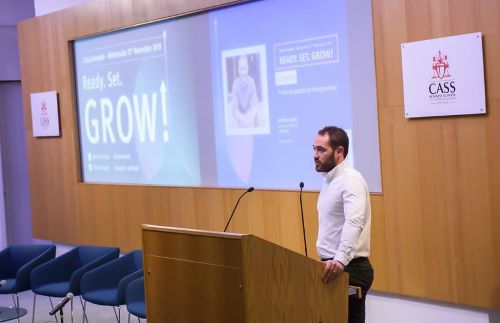Facing your fears: What I learned from Cass Innovate 2019
The Business School’s yearly flagship event Bayes Innovate is attended by entrepreneurs, business owners, finance professionals, consultants and students. Its diverse attendees really shows the living and breathing entrepreneurship ecosystem nurtured by the Business School and City, University of London.
The keynote speech by Andrew Lynch, MSc Investment Management (2009) from Huckletree reminded me of the Steve Jobs theory of “connecting the dots.” Jobs’ theory is that it’s only possible to connect the dots looking backwards, so when launching your own venture you must trust your intuition. Andrew’s background and earlier experience in property and finance led him to venture into a business specialising in the coworking space and accelerator Huckletree.
The breakout sessions offered at the event were mixed from talks, workshops and panel discussions to serve the need of a wider audience. The workshop The fear of failure: the number 1 enemy was particularly engaging and thought-provoking. The workshop was jam-packed with attendees from various backgrounds seeking an answer to the critical question: “what’s holding you back?”

Delivered by Professor Costas Andriopoulos, we started the workshop by filling in a CV of sorts of our failures. We wrote about what we didn’t get into: job positions, degree programmes, or other failures in life. Initially, I found this exercise counter-intuitive, especially as a CV is all about one’s achievements. The exercise of writing about your failures was a daunting task at first, but at the same time, it also instills the idea of pushing yourself to find alternatives. One more thing I picked up from the session was how to assess the possible negative consequences of an idea through analysis and ranking to explore ways to mitigate it. In fact, this is the first time I ever attended a session on failure and it has changed my mindset on failure and success.
The session Financing methods throughout a company’s lifecycle, led by Professor Meziane Lasfer, was useful due to its real-world applications to raise the funding your own venture. Professor Lasfer succinctly explained the various methods of raising equity, be it from angel investment, venture capital (VC), private equity, debt and IPO. The session was attended by many budding entrepreneurs, serial entrepreneurs, small business owners as well as investors. Professor Lasfer led the session using the sources of funding used by Amazon as an example. The astonishing journey from launching a company to IPO truly illustrated the need for entrepreneurs and business owners. The Amazon example also provided a glimpse into the profit an investor can make through the different stages of investing in a company.
The final session I attended covered the topic of a Founder exit using research from three studies and was delivered by Professor Vangelis Souitaris and Dr Stefania Zerbinati. I gained insight into the reasons why founders decide to exit– for an example, it may be simply frustration due to lack of power. I learned how founders exit— financial exit, management exit, or simply a combination of two— and what they do afterwards. The most interesting aspect of the session was the opportunity to meet completely different sets of attendees, as many of them have an experience of selling their business in the past.
Overall, the event was well organised and refreshment breaks between sessions gave attendees enough time to connect, re-connect and swap business cards over tea or coffee. There was also plenty of time for networking over wine and nibbles at the end of the day and I look forward to attending Bayes Innovate in 2020.
Amit Shah, Modular Executive MBA (2021)